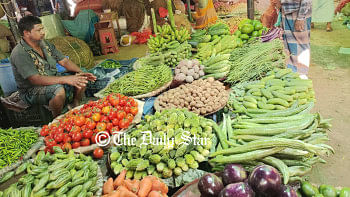Challenges before the EC & AL in next phases of UZ polls
THE preparation of the voter list with photographs before the 2008 parliamentary election had paved the way for bringing an end to the long pervasive culture of fake voting in the elections. The strong leadership of the then Election Commission (EC), led by A.T.M. Shamsul Huda, in guiding and supervising the election administration had also largely contributed to burying the culture of using illegal means in the polls.
Incidents of fake voting were rare in the polls to the Jatiya Sangsad on December 29, 2008. This development continued in a series of elections to different local government bodies—city corporations, municipalities and union parishads—during the Huda-led EC. The current EC, led by Kazi Rakibuddin Ahmad, benefitted from this in the five city corporation elections held in the middle of last year, though it was unable to demonstrate strong leadership.
Unfortunately, the controversial January 5 parliamentary election reversed the advancement in the electoral system. The voter-less election held amid a boycott by the BNP-led alliance appeared as a major challenge for the ruling Awami League to make it credible by ensuring an impressive voter turnout. But voters were not interested in the one-sided election. Moreover, polls were not held in more than half of the 300 parliamentary seats because candidates in those seats were elected uncontested. But even in an uncontested election, ruling party supporters cast fake votes in many polling stations. There were incidents of stuffing of ballot papers. All the wrongdoings went unchallenged and unpunished, though casting fake votes is a criminal and punishable offence and means denial of one's constitutional right to vote. Thanks to the current EC's poor leadership, the malpractice of casting fake votes returned after a gap of only five years.
Concerted efforts are required to bring an end to this bad culture, which automatically grows stronger if it is not stopped. This was proved in the first phase of the elections to upazila parishads held on February 19. AL men became unruly in more than a dozen upazilas and cast fake votes, snatched ballot papers and ousted their rivals' agents from the polling stations to influence the elections in their favour. The EC's inability to take action against these electoral offences was exposed. CEC Kazi Rakibuddin Ahmad, however, claimed that the EC was successful in holding the first phase of the elections in a free, fair and peaceful manner. He acknowledged that some untoward incidents took place in the polls, but did not say whether the EC would take action against those who caused trouble in some upazilas. He ignored the truth. The untoward incidents in more than a dozen upazilas out of 97 cannot be sporadic!
If any wrongdoing goes unpunished, troublemakers always feel encouraged to go ahead with dishonest activities. In the first phase elections to 97 upazila parishads, the AL men could not fare better than their rivals backed by BNP. The better performance in the first phase battle of ballots has boosted the morale of BNP grassroots level leaders and supporters. The situation is the opposite in the AL camp. It is assumed that the AL men will desperately try to fare better than their rivals supported by the BNP in the next battle of ballots in 117 upazilas on February 27. Now, Kazi Rakibuddin and his team will have to reassess their strategy to keep the second phase polls free from any unruly behaviour by AL men. If they fail to do so, the third, fourth and fifth phase elections may see more unpleasant incidents like casting of fake votes. Rakibuddin and his team must decide without delay whether they will contribute towards damaging the electoral system or take measures to regain the image built up five years ago.
AL and the government must also do something to prevent their unruly activists from influencing the elections through illegal and criminal means. If things remain unaddressed, it will taint the image of the government and the AL. Yet AL and the government could have claimed the credit for holding a free, fair and peaceful election had not the ruling party men done unruly things in some upazilas on February 19. There is still time for the government and AL to take steps to prevent the situation from deteriorating further in the next phases of upazila parishads polls. The party may issue directives to its grassroots level leaders urging them not to engage in any dishonest means in the polls. It may warn them of taking stern actions if anyone is found involved in casting fake votes or snatching ballots papers or ousting oppositions' polling agents. The government may urge law enforcers to take action against troublemakers irrespective of their party affiliation.
If the government, AL and the EC take actions to avert unpleasant incidents in the next phases of the polls, it will brighten their image. Otherwise, the situation may deteriorate further and infuse fresh blood to the culture of fake voting in the polls, thereby denying people's constitutional rights to vote. And the trio will be held responsible for damaging the electoral system.
The damage already done to the electoral system has been a major threat to the country's democracy centering on the elections. People enjoy their democratic rights only in elections due to undemocratic attitude of the successive governments and the major political parties. So the election is taken as a festival of democracy. If the purity of this festival is tainted again, people's democracy will not find any space in the country.
The writer is Senior Reporter, The Daily Star.

 For all latest news, follow The Daily Star's Google News channel.
For all latest news, follow The Daily Star's Google News channel. 



Comments